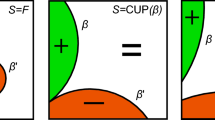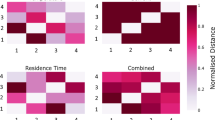Abstract
No free lunch theorems for optimisation suggest that empirical studies on benchmarking problems are pointless, or even cast negative doubts, when algorithms are being applied to other problems not clearly related to the previous ones. Roughly speaking, reported empirical results are not just the result of algorithms’ performances, but the benchmark used therein as well; and consequently, recommending one algorithm over another for solving a new problem might be always disputable. In this work, we propose an empirical framework, arbitrary function optimisation framework, that allows researchers to formulate conclusions independent of the benchmark problems that were actually addressed, as long as the context of the problem class is mentioned. Experiments on sufficiently general scenarios are reported with the aim of assessing this independence. Additionally, this article presents, to the best of our knowledge, the first thorough empirical study on the no free lunch theorems, which is possible thanks to the application of the proposed methodology, and whose main result is that no free lunch theorems unlikely hold on the set of binary real-world problems. In particular, it is shown that exploiting reasonable heuristics becomes more beneficial than random search when dealing with binary real-world applications.






Similar content being viewed by others
References
Auger A, Teytaud O (2007) Continuous lunches are free. In: Proceedings of the genetic and evolutionary computation conference, ACM Press, New York, pp 916–922
Auger A, Teytaud O (2008) Continuous lunches are free plus the design of optimal optimization algorithms. Algorithmica 57(1):121–146. doi:10.1007/s00453-008-9244-5
Barr RS, Golden BL, Kelly JP, Resende MG, Stewart WRJ (1995) Designing and reporting on computational experiments with heuristic methods. J Heuristics 1:9–32
Beasley J (1998) Heuristic algorithms for the unconstrained binary quadratic programming problem. Techical report, The Management School, Imperial College
Blancke S, Boudry M, Braeckman J (2010) Simulation of biological evolution under attack, but not really: a response to Meester. Biol Philos 26(1):113–118. doi:10.1007/s10539-009-9192-8
Blum C, Puchinger J, Raidl GR, Roli A (2011) Hybrid metaheuristics in combinatorial optimization: a survey. Appl Soft Comput 11(6):4135–4151
Chen DS, Batson R, Dang Y (2010) Applied integer programming: modeling and solution. Wiley, Chichester
Corne DW, Knowles JD (2003) No free lunch and free leftovers theorems for multiobjective optimisation problems. Evol Multi Crit Optim LNCS 2632:327–341. doi:10.1007/3-540-36970-8_23
Dembski WA, Marks II RJ (2009) Conservation of information in aearch: measuring the cost of auccess. IEEE Trans Syst Man Cybernet Part A 39(5):1051–1061. doi:10.1109/TSMCA.2009.2025027
Dembski WA, Marks II RJ (2010) The Search for a aearch: measuring the information cost of higher level search. J Advan Comput Intell Intell Informatics 14(5):475–486
Derrac J, García S, Molina D, Herrera F (2011) A practical tutorial on the use of nonparametric statistical tests as a methodology for comparing evolutionary and swarm intelligence algorithms. Swarm Evol Comput 1(1):3–18
Droste S, Jansen T, Wegener I (1999) Perhaps not a free lunch but at least a free appetizer. In: Proceedings of the genetic and evolutionary computation conference (GECCO’99), Morgan Kaufmann, pp 833–839
Droste S, Jansen T, Wegener I (2002) Optimization with randomized search heuristics—the (A)NFL theorem, realistic scenarios, and difficult functions. Theor Comput Sci 287(1):131–144
Eshelman L, Schaffer J (1991) Preventing premature convergence in genetic algorithms by preventing incest. In: Belew R, Booker L (eds) International conference on genetic algorithms. Morgan Kaufmann, San Mateo, pp 115–122
Forrest S, Mitchell M (1993) Relative building block fitness and the building block hypothesis. In: Whitley L (ed) Foundations of genetic algorithms 2. Morgan Kaufmann, San Mateo, pp 109–126
Friedman M (1940) A comparison of alternative tests of significance for the problem of m rankings. Ann Math Stat 11(1):86–92
Garcia S, Fernández A, Luengo J, Herrera F (2009a) A study of statistical techniques and performance measures for genetics-based machine learning: accuracy and interpretability. Soft Comput 13(10):959–977
Garcia S, Molina D, Lozano M, Herrera F (2009b) A Study on the use of non-parametric tests for analyzing the evolutionary algorithms’ behaviour: a case study on the CEC’2005 special session on real parameter optimization. J Heuristics 15(6):617–644
García-Martínez C, Lozano M (2010) Evaluating a local genetic algorithm as context-independent local search operator for metaheuristics. Soft Comput 14(10):1117–1139
García-Martínez C, Lozano M, Rodriguez FJ (2011a) Arbitrary function optimization. No free lunch and real-world problems. http://www.uco.es/grupos/kdis/kdiswiki/index.php/AFO-NFL
García-Martínez C, Rodríguez-Díaz FJ, Lozano M (2011b) Role differentiation and malleable mating for differential evolution: an analysis on large-scale optimisation. Soft Comput 15(11):2109–2126. doi:10.1007/ s00500-010-0641-8
García-Martínez C, Lozano M, Rodríguez-Dìaz FJ (2012) A simulated annealing method based on a specialised evolutionary algorithm. Appl Soft Comput 12(2):573–588
Glover F, Laguna M (1997) Tabu search. Kluwer Academic Publishers, Norwell
Goldberg D, Korb B, Deb K (1989) Messy genetic algorithms: motivation, analysis, and first results. Complex Syst 3:493–530
Gortázar F, Duarte A, Laguna M, Martí R (2010) Black box scatter search for general classes of binary optimization problems. Comput Operat Res 37(11):1977–1986. doi:10.1016/j.cor.2010.01.013
Hansen N (2005) Compilation of results on the CEC benchmark function set. Technical report, Institute of Computational Science, ETH Zurich, Switzerland
Herrera F, Lozano M, Verdegay J (1998) Tackling realcoded genetic algorithms: operators and tools for behavioral analysis. Artif Intell Rev 12(4):265–319
Holm S (1979) A simple sequentially rejective multiple test procedure. Scand J Stat 6:65–70
Hooker JN (1995) Testing heuristics: We have it all wrong. J Heuristics 1(1):33–42. doi:10.1007/ BF02430364
Igel C, Toussaint M (2003) On classes of functions for which no free lunch results hold. Inform Process Lett 86(6):317–321
Igel C, Toussaint M (2004) A no-free-lunch theorem for non-uniform distributions of target functions. J Math Modell Algorithms 3(4):313–322
Iman R, Davenport J (1980) Approximations of the critical region of the Friedman statistic. Commun Stat 9:571–595
Jiang P, Chen Y (2010) Free lunches on the discrete Lipschitz class. Theor Comput Sci 412(17):1614–1628. doi:10.1016/j.tcs.2010.12.028
Jünger M, Liebling T, Naddef D, Nemhauser G, Pulleyblank W et al (eds) (2009) 50 Years of integer programming 1958–2008: from the early years to the state-of-the-art. Springer, Berlin
Karp R (1972) Reducibility among combinatorial problems. In: Miller R, Thatcher J (eds) Complexity of computer computations. Plenum Press, New York, pp 85–103
Kauffman S (1989) Adaptation on rugged fitness landscapes. Lect Sci Complex 1:527–618
Kirkpatrick S, Gelatt Jr C, Vecchi M (1983) Optimization by simulated annealing. Science 220(4598):671–680
Koehler GJ (2007) Conditions that obviate the no-free- lunch theorems for optimization. INFORMS J Comput 19(2):273–279. doi:10.1287/ijoc.1060.0194
Laplace PS (1814) Essai philosophique sur les probabilités. Technical report, Paris, Courcier
Lozano M, García-Martínez C (2010) Hybrid metaheuristics with evolutionary algorithms specializing in intensification and diversification: overview and progress report. Comput Operat Res 37:481–497
Lozano M, Herrera F, Molina D (eds) (2011) Scalability of evolutionary algorithms and other metaheuristics for large scale continuous optimization problems, vol 15. Soft Computing
Marshall JAR, Hinton TG (2010) Beyond no free lunch: realistic algorithms for arbitrary problem classes. In: IEEE Congr Evol Comput 1:18–23
Pelikan M, Goldberg D, Cantú-Paz E (2000) Linkage problem, distribution estimation, and bayesian networks. Evol Comput 8(3):311–340
Rodriguez FJ, García-Martínez C, Lozano M (2012) Hybrid metaheuristics based on evolutionary algorithms and simulated annealing: taxonomy, comparison, and synergy test. IEEE Trans Evol Comput. doi:10.1109/TEVC.2012.2182773
Schaffer J, Eshelman L (1991) On crossover as an evolutionary viable strategy. In: Belew R, Booker L (eds) Proceedings of the international conference on genetic algorithms. Morgan Kaufmann, San Mateo, pp 61–68
Schumacher C, Vose MD, Whitley LD (2001) The No Free Lunch and Problem Description Length. In: Proc. of the Genetic and Evolutionary Computation Conference, pp 565–570
Service TC (2010) A no free lunch theorem for multiobjective optimization. Inform Process Lett 110(21):917–923. doi:10.1016/j.ipl.2010.07.026
Smith K, Hoos H, Stützle T (2003) Iterated robust tabu search for MAX-SAT. In: Carbonell J, Siekmann J (eds) Proceedings of the Canadian society for computational studies of intelligence Conference, vol LNCS 2671. Springer, Berlin, pp 129–144
Talbi E (2002) A taxonomy of hybrid metaheuristics. J Heuristics 8(5):541–564
Thierens D (2002) Adaptive mutation rate control schemes in genetic algorithms. In: Proceedings of the congress on evolutionary computation, pp 980–985
Thierens D (2004) Population-based iterated local search: restricting neighborhood search by crossover. In: Proceedings of the genetic and evolutionary computation conference, vol LNCS 3103. Springer, Berlin, pp 234–245
Watson R, Pollack J (1999) Hierarchically consistent test problems for genetic algorithms. Proc Congr Evol Comput 2:1406–1413
Whitley D, Rowe J (2008) Focused no free lunch theorems. In: Proceedings of the genetic and evolutionary computation conference. ACM Press, New York, pp 811–818. doi:10.1145/1389095.1389254
Whitley D, Watson JP (2005) Complexity theory and the no free lunch theorem. Search Methodologies, Springer, Berlin, pp 317–339. doi:10.1007/0-387-28356-0_11
Whitley D, Rana S, Dzubera J, Mathias E (1996) Evaluating evolutionary algorithms. Artif Intell 85:245–276
Wolpert D, Macready W (1997) No free lunch theorems for optimization. IEEE Trans Evol Comput 1(1):67–82
Zar J (1999) Biostatistical analysis. Prentice Hall, Upper Saddle River
Acknowledgments
Beliefs usually need to be critically analysed before becoming real knowledge. Being loyal to this idea, the authors would like to express that this study would not have been initiated without the fact that, their journal submissions proposing new approaches, and analysed on many different kinds of problems, were sometimes rejected on the claim that '’according to the NFL, if your proposal wins, then it loses on the rest of problems that have not been analysed”. Therefore and being honest with ourselves, this study, we are really glad of having developed, is in part thanks to the corresponding reviewers and deciding editors’ comments that put us on the way.
Author information
Authors and Affiliations
Corresponding author
Additional information
Research Projects TIN2011-24124 and P08-TIC-4173.
Rights and permissions
About this article
Cite this article
García-Martínez, C., Rodriguez, F.J. & Lozano, M. Arbitrary function optimisation with metaheuristics. Soft Comput 16, 2115–2133 (2012). https://doi.org/10.1007/s00500-012-0881-x
Published:
Issue Date:
DOI: https://doi.org/10.1007/s00500-012-0881-x




